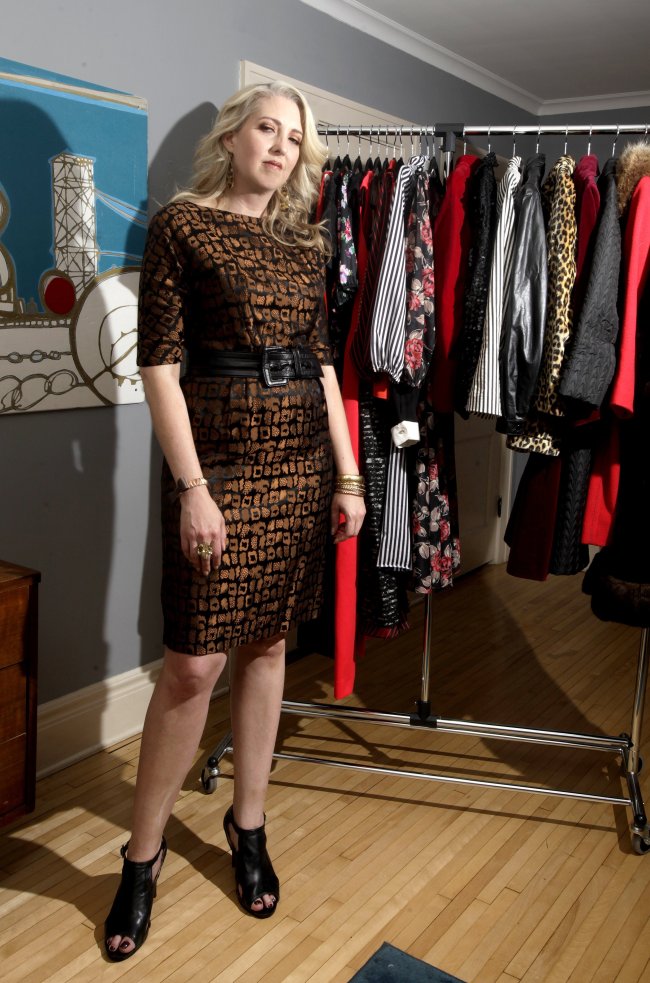MINNEAPOLIS ― Kristine Huson can spot a designer label at Goodwill in seconds. She can zip through the racks of her favorite vintage store even faster.
The 42-year-old South St. Paul, Minnesota, woman has joined an ethical fashion movement of consumers striving to be more mindful of their buying habits. These socially conscious style mavens want to know where their clothes came from, who made them and how they got here. For some, that means buying American-made; others sew their own. Shoppers like Huson turn to the past.
“By shopping vintage, I know that the garments were made well by union garment workers, no one else is likely to have them, and they have already stood the test of time,” said Huson, whose wardrobe is 85 percent vintage. “I can buy a new dress and know that it’s not going to end up in a landfill somewhere ... it’s living a new life on my shoulders.”
The 42-year-old South St. Paul, Minnesota, woman has joined an ethical fashion movement of consumers striving to be more mindful of their buying habits. These socially conscious style mavens want to know where their clothes came from, who made them and how they got here. For some, that means buying American-made; others sew their own. Shoppers like Huson turn to the past.
“By shopping vintage, I know that the garments were made well by union garment workers, no one else is likely to have them, and they have already stood the test of time,” said Huson, whose wardrobe is 85 percent vintage. “I can buy a new dress and know that it’s not going to end up in a landfill somewhere ... it’s living a new life on my shoulders.”

Huson has steered clear of mass retailers for as long as she could dig through her grandmother’s closet. For some, it’s taken the deadliest disaster in the history of the garment industry to give them pause about their purchases. More than 1,100 factory workers died in Bangladesh following a much-publicized building collapse in April. For some pundits, “fast fashion” suddenly became “fatal fashion.”
“The price for cheap fashion is slave labor and inhumane working conditions,” said Beth Bowman, 35, of St. Paul. “I try not to participate in that, but maybe once a year I do want some cute, trendy earrings for $4.99.”
While many Americans say they would prefer to buy American-made products, only 2 percent of clothes bought in the United States are actually made here, according to the American Apparel and Footwear Association. In the 1960s, 95 percent of what we wore was made here, according to Save the Garment Center.
That disconnect makes it difficult to change habits, said Kim Hye-young, an assistant professor in the University of Minnesota’s retail merchandising program.
“People say fast fashion is like fast food, because it’s addictive and unhealthy,” Kim said. “But like the slow food movement, consumer activists are organizing some lifestyle change movements. Consumers will dictate the direction of future retailing.”
As this wave of socially conscious shopping gains steam, business at secondhand stores is picking up, especially among women. Allison Bross-White recently moved her consignment shop, B. Resale, to a new location in south Minneapolis that’s twice as big.
“Another driving force in the growth of secondhand businesses is the fact that it’s become more acceptable to wear used clothing,” she said. “Before the recession, there was a stigma.”
The DIY ethic also is on the rise. People have always been into sewing quilts or bags, but in the past two years, Trish Hoskins of sewing and knitting shop Crafty Planet has seen an uptick in fashion sewing.
The number of members at BurdaStyle (www.burdastyle.com), a five-year-old social network for sewing novices, grew to 753,184 in mid-May, a rise of 47 percent from a year earlier, the company said.
Sewing-machine sales are booming, too, with sales in the United States expected to top 3 million in 2012, according to SVP Worldwide, maker of Singer sewing machines. That’s double the number from a decade ago.
The trend is driven partly by the popularity of fashion-focused TV shows, but Hoskins says it’s more than that: “People want to be able to customize their look without compromising their ethics and breaking the bank.”
By Aimee Blanchette, Star Tribune (Minneapolis)
(MCT)
-
Articles by Korea Herald









![[Hello India] Hyundai Motor vows to boost 'clean mobility' in India](http://res.heraldm.com/phpwas/restmb_idxmake.php?idx=644&simg=/content/image/2024/04/25/20240425050672_0.jpg&u=)










